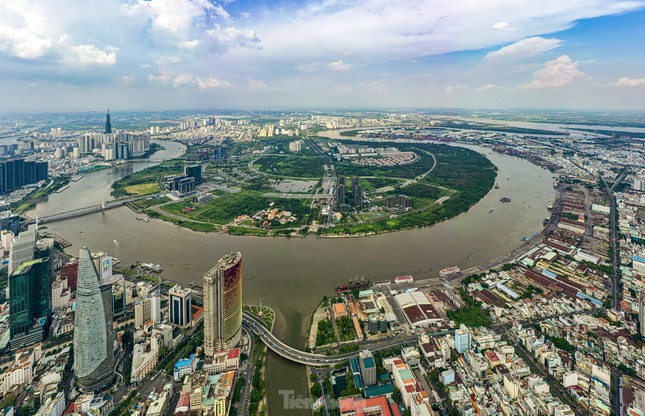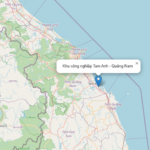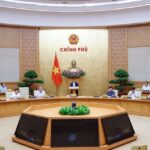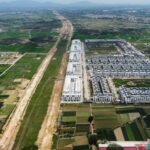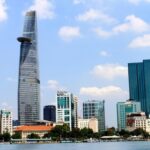According to experts, the formation of international financial centers in Ho Chi Minh City and Da Nang marks a new phase for the development of special economic zones. This initiative will create a new bridge for capital attraction, facilitating cross-border transactions 24/7 and boosting the economy in a new direction. However, there remain legal, human resource, and investment environment issues to be addressed to create a conducive framework for these financial centers to operate effectively.
Article 1: Opening New Avenues for Capital Attraction
Experts assert that the pilot implementation of breakthrough and modern development models, with a focus on establishing and operating international financial centers in Ho Chi Minh City and Da Nang, will propel Vietnam towards a new phase of growth. These centers will serve as crucial anchors for mobilizing substantial capital for green economy, circular economy, and high-tech projects in key sectors such as electronics, AI, hydrogen, and fintech.
A New Step Forward for the Capital Market
According to experts, Vietnam’s decision to establish a single financial center with a presence in both Ho Chi Minh City and Da Nang is a rational model, as opposed to setting up two independent centers.
If the goals set for 2045 are achieved, Vietnam will emerge as a regional financial hub, attracting investments and enhancing its competitiveness. It will be able to rival established financial centers in the region, such as Singapore, Hong Kong, and Shanghai.
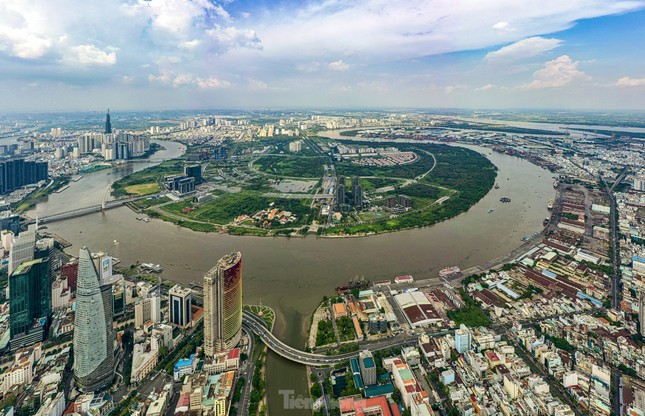
The area along the Saigon River in District 1 and Thu Thiem will serve as the development zone for Ho Chi Minh City’s International Financial Center. Photo: Duy Anh
The draft outline on the establishment and operation of the Financial Center in Vietnam proposes that, alongside the formation of the Financial Center, regulations on anti-money laundering, including those related to crypto-assets, will be promulgated and supplemented.
Consequently, members of the Financial Center established by foreign investors will be permitted to freely convert a certain amount of Vietnamese dong derived from legitimate revenues or assets formed within Vietnam into foreign currency, equivalent to 100% of the foreign currency previously converted into dong, without having to justify the purpose of the conversion.
After five years of business and investment operations, members of the Financial Center will be allowed to freely transfer legitimate investment and other revenues in foreign currency outside of Vietnam’s territory without having to justify the purpose of the fund transfer, provided they have fulfilled their financial obligations as stipulated by regulations.
Additionally, the procedures for the establishment and management of foreign credit institutions operating and providing services within the Financial Center will be simplified to the maximum extent possible.
Domestic and foreign credit institutions that meet the Basel III capital adequacy standards will be exempt from licensing conditions when establishing subsidiaries in the Financial Center to provide forex services. They will also be exempt from complying with the State Bank of Vietnam’s regulations on capital adequacy standards for these subsidiaries.
These entities will be permitted to utilize computer systems located abroad for their business operations. The criteria for selecting reputable domestic and foreign credit institutions will be issued by the Management and Administration Committee of the Financial Center at appropriate times.
Banks or credit institutions headquartered at the Financial Center will not be subject to foreign ownership ratio restrictions or foreign investment conditions regarding the provision of services within the Financial Center or cross-border services.
To ensure the effective operation of the Financial Center, the Management and Administration Committee of the Financial Center will be authorized to grant licenses, manage, assess the impact, and govern risks associated with controlled experiments (sandbox) in the application of technology in the financial sector (fintech), including exchanges for crypto-assets and cryptocurrencies. The maximum duration for such experiments is three years, with a possible extension of up to three additional years.
Attractive Incentives for Fintech Startups
One notable aspect regarding startup attraction is that economic entities that are innovative fintech startups operating within the Financial Center will be eligible for mechanisms and preferential policies applicable to organizations operating within the National Innovation Center or higher incentives for innovation activities as stipulated by the Government.
These entities will also receive non-refundable support from the local budget for fintech project development costs, including expenses for organizing selection activities, hiring experts, direct labor costs, innovation support services, facility usage fees for incubation, R&D, technology refinement, and product pilot production.
Additionally, foreign enterprises will be permitted to establish separate exchanges for startups to promote innovation and form an innovation ecosystem within the Financial Center.
Furthermore, to develop the capital market, financial green activities within the scope of the Financial Center (such as carbon credit trading and green project financing) will be granted incentives similar to those for sectors in the list of specially encouraged investment fields.
When foreign banks establish branches or relocate their headquarters or representative offices to the Financial Center in Vietnam, they will be eligible for incentives applicable to sectors in the list of encouraged investment fields.
To encourage transparency in operations, entities within the Financial Center will be free to choose to apply international standards for accounting, finance, and financial reporting. If they have already complied with international standards, they will be exempt from domestic regulations.
Another novel aspect concerning the formation of the Financial Center is that its members will be entitled to establish enterprises for specific purposes to raise capital for investment and business activities. They will also be exempt from complying with regulations on foreign loans, direct investment, and indirect investment as stipulated in the foreign exchange management regulations.
An additional attractive mechanism is the preferential policy on personal income tax for individuals working at the Financial Center. Accordingly, managers, scientists, and highly qualified experts with taxable personal income generated at the Financial Center will be exempt from personal income tax.
Other individuals with taxable personal income generated at the management agencies of the Financial Center or its members will be exempt from personal income tax until the end of 2035 and will enjoy a 50% reduction in the personal income tax payable in the following years.
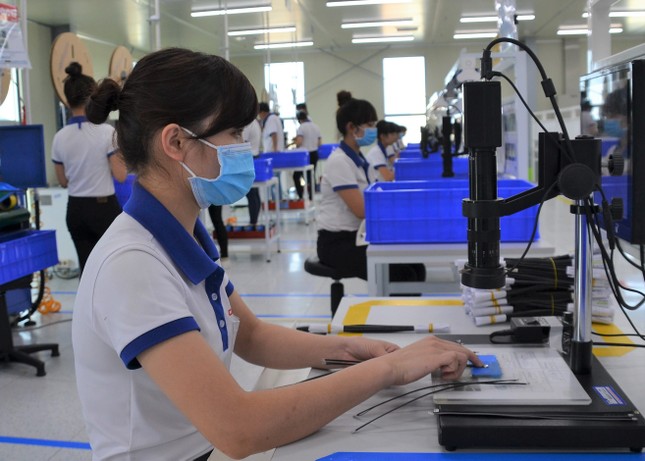
Developing Ho Chi Minh City into an International Financial Center will enhance its attractiveness and further boost FDI inflows. Photo: U.P
Notably, investment projects in priority sectors of the Financial Center will enjoy a tax rate of 10% throughout the project’s duration and will be exempt from tax for the first four years and enjoy a 50% reduction in taxable income for the following nine years.
For other investment projects in the Financial Center, including income from real estate transfers, the applicable tax rate will be 10% for 15 years, with a tax exemption for the first four years and a 50% reduction in taxable income for the subsequent nine years.
In the proposal for developing the International Financial Center submitted by the Ho Chi Minh City People’s Committee for feedback, the Department of Finance proposed a total area of approximately 687 hectares, including sub-areas and the financial center in District 1, along with the new urban area of Thu Thiem, covering approximately 564 hectares.
According to the Ho Chi Minh City Department of Finance, this option is believed to offer more room for development. The proposal aligns with the spirit of the Politburo’s directives and the approved master plan by central and local authorities. This option differs from Option 1, which suggested a location in the CBD (sub-area 1) of the new urban area of Thu Thiem, Thu Duc City, and a part of District 1, covering approximately 340 hectares.
Income from investment projects of enterprises and corporations listed in the Forbes 500 list of the previous year will be exempt from corporate income tax for two additional years and will enjoy a 50% reduction in taxable income for the next four years.
In cases where an investor’s project meets multiple conditions for enjoying different levels of corporate income tax incentives, the investor will be entitled to choose the most favorable option.
Regarding human resource training and attraction, the draft also proposes that new and expanded investment projects within the Financial Center will receive support from the state budget for vocational training costs for the first two years from the date of obtaining the Investment Registration Certificate.
The support for vocational training costs will be implemented through vocational training institutions chosen by the investor, following the cost-sharing principle between the state and the investor. The state budget will also support the training of human resources with a university degree or higher for the Financial Center for four years.
The training of human resources with a university degree or higher will be conducted through training institutions selected by the Management and Administration Committee of the Financial Center.
The Management and Administration Committee of the Financial Center will determine the demand, target employees to be attracted, support policies for human resource development, and decide on the level of support for vocational training costs and training of human resources with a university degree or higher.
The draft also outlines other attractive policies for strategic investors, land policies within the Financial Center, construction procedures, the environment, fire prevention and control, and the “one-door” mechanism for customs procedures and specialized inspections.
Additionally, the pilot implementation of breakthrough and modern development models is underway, focusing on establishing and operating international financial centers in Ho Chi Minh City and Da Nang. These centers will serve as crucial anchors for mobilizing substantial capital for green economy, circular economy, and high-tech projects in key sectors.
Furthermore, investments will continue to be made in modern infrastructure, such as the North-South high-speed railway and urban railway systems, to elevate the country’s economic development.
The Need for a Distinctive Approach
At a meeting of the Government’s Standing Committee with relevant ministries, sectors, and localities regarding the construction of the International Financial Center in Vietnam on May 10, Prime Minister Pham Minh Chinh emphasized that for the International Financial Center in Vietnam to succeed, it must offer something unique and have special mechanisms to attract capital for the country’s rapid and sustainable development, while also ensuring profitability for investors, creating a mutually beneficial situation.
The Prime Minister requested the units and localities to assess the positive impacts, challenges, and risks and propose solutions to address the risks. He also instructed them to propose a strategy for building the International Financial Center in Vietnam with a distinctive approach that leverages its comparative advantages.
Reviewing the Tam Anh 3 – Indusvalley Industrial Park Project in Quang Nam Province
“The People’s Committee of Quang Nam Province recently communicated with the Management Board of the Economic and Industrial Zones regarding the proposal for the investment project to construct and operate the infrastructure of the Tam Anh 3 – Indusvalley Industrial Park.”
Unlocking Investment Opportunities: Overcoming Legal Obstacles with Courage and Foresight
In its relentless pursuit of enhancing the business environment, Vietnam has introduced a slew of policies, hosted numerous dialogue forums, and established investor support channels. However, a significant number of investors, both domestic and foreign, remain hesitant due to institutional constraints and bottlenecks, including certain impediments within the Investment Law.
Proposed Site for the Future City in Hanoi to be Exempted from Land Lease for 50 Years
The Hanoi authorities have proposed an exemption of land rent for up to 50 years for investment projects in socialization undertaken in the High-Tech Park of Lang Hoa Lac, and the districts of Dong Anh, Me Linh, and Soc Son. These areas are earmarked for development as a model satellite city under the jurisdiction of Hanoi.
Building Ho Chi Minh City’s Financial Centre: Potential Meets Challenges
As Vietnam’s economic powerhouse, Ho Chi Minh City is ambitiously striving to establish itself as an international financial hub. This strategic vision is aimed at bolstering the city’s economic prowess and attracting global investment, thereby elevating its status on the world stage. This endeavor is not merely a municipal aspiration but also a pivotal component of the nation’s overarching development strategy.

